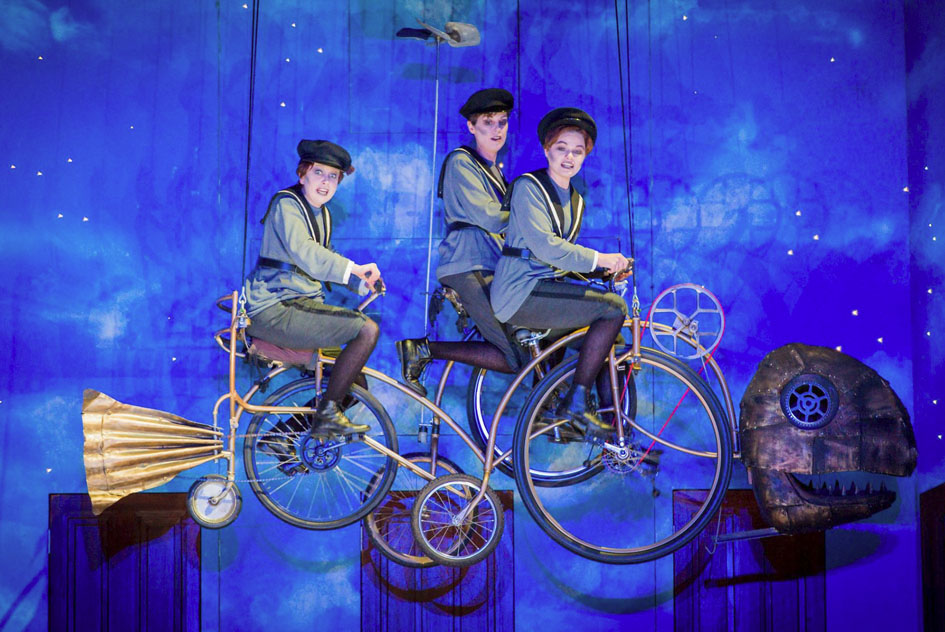WNO’s current production of Mozart’s The Magic Flute has been given a surrealistic dressing. It begins with Tamino being pursued by a giant Dali-esque lobster. And his travails to win the right to love the Queen of the Night’s daughter Pamina are played out in a Magritte-like tableau of doors set into walls painted to look like sky. The stage is raised to allow some extraordinary scenes later when the Sorastro ‘brotherhood’ is visible only by dint of their heads protruding up through the elevated boards wearing bright orange Magritte-inspired bowler hats. The overall effect is like watching a large animated painting suspended on a black wall. This bold design by Julian Crouch has been seized upon by director Dominic Cooke to great effect, with multiple entrances and light sources available to him through the many portals from this forced perspective.
From beginning to end there were faultless performances by the entire ensemble. The ‘supporting’ cast, the Three Ladies (Camilla Roberts, Máire Flavi and Emma Carrington), and then Papagena (Claire Hampton) got as big if not bigger cheers as some of the leading roles at the performance’s close. And throughout, with Lothar Koenig’s subtle promptings from the rostrum, there was a sensitive and well-balanced performance from the WNO orchestra.
I have often wondered just what it is that goes on behind freemasons’ walls – and I personally hold grave suspicions of any male-dominated hierarchies and fetishisms. In Magic Flute there is curious ambiguity. Do we sympathise with the Queen, drained of her powers and whose daughter Pamina has been abducted and imprisoned by the all-powerful ‘Grand Master’ Sorastro? Or do we finally believe that it is he alone that is the keeper of the keys when it comes to virtue, honour and wisdom? Magic Flute is destined to remain embroiled with a gender battle at its core. With Sorastro’s pronouncement that “a woman needs a man to guide her” I could sense every good feminist in the audience squirm with discomfort.
Luckily for us Mozart and librettist Schikaneder help us through these powerful conundrums by peppering a potentially dark tale with some of the lightest and funniest of moments in opera, thanks in main to the character of Papageno who is played charmingly by South African baritone Jacques Imbrailo. Looking not unlike Harpo Marx with his curly mop wig, and sporting a feathery multi-coloured coat, Imbrailo’s performance grew in strength as the night went on. He managed to convey fear and silliness in equal measure, and there was real chemistry between him and Papagena when she finally revealed herself to him.
Flute’s apex of course resides in the Queen of the Night’s arias in which she reaches the impossibly high F6’s. Samantha Hay reliably delivered piercingly clear notes that pinned Mozart’s most testing of ranges. Her emotionally charged Hell’s Vengeance Boils in my Heart glowed with vitriol, as she utterly convinced as a woman demented with rage. And later Pamina (Sophie Bevan) echoed that visceral passion in her solo My Death Will Bring Me Peace.
The duets were a constant delight. Tamino (Allan Clayton) and Pamina (Sophie Bevan), and Papageno and Papagena fused their voices together with the most sympathetic of tones, while The Three Ladies sang with wit and razor sharp timing. Scott Wilde delivered Sorastro’s gravelly bass with aplomb, while Howard Kirk skulked Nosferatu-like as the leering and conniving Monostratos. Recommended. ★★★★★ Simon Bishop 10/04/15


